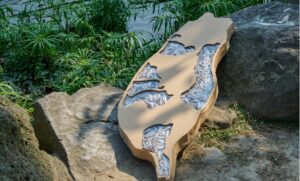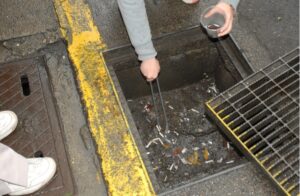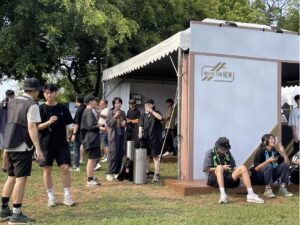Reporters/Wu, Hsing-Fang,Yang, Tzu-Hsuan, Chuang, Chia-Fang, Tan, Shiao-Qin
According to a survey conducted by the National Health Service of the Ministry of Health and Welfare, the proportion of the smoking population in Taiwan has been decreasing year by year. However, the government’s publicity and the enactment of smoking-related laws have not significantly reduced the proportion of smokers discarding cigarette butts where they shouldn’t have.
In fact, “Vision Magazine” reported on the environmental pollution caused by cigarette butts, highlighting on the fact that cigarette butts are the plastic waste which causes one of the most serious environmental pollutions. It’s hard to know how many litterbugs are too lazy to find a trash can, and how many people wrongly believe that cigarette butts will quickly biodegrade.

High School Students Trying to Reduce Cigarette Butt Pollution
A group of students from Taipei First Girls High School founded “Girls in the Oasis” in 2020, which was originally an environmental protection organization formed by four female students. These students were committed to taking practical actions, such as street cleaning activities for high school students, the design of 2-in-1 environmentally friendly cigarette packs, and promotion of environmental education, hoping to combat cigarette butt pollution in Taiwan and create an “oasis” wherein there will be no more cigarette butts on the streets.

“Girls in the Oasis” has been established for three years, with Qiu, Ruo-an and Zheng, Zhi-yun currently in charge. They said that most of the funds for the activities come from prize money obtained through competitions or donations from group members.
Zheng, Zhi-yun, another member of “Girls in the Oasis,” said that the reason why the school’s students founded this group was because during a beach cleaning activity, they accidentally found that the number of cigarette butts on the beach was much higher than that of ordinary plastic waste, so they began to pay attention to cigarette butt pollution issues and try to solve this problem.
After many trials and errors, they have developed a 2-in-1 environmentally-friendly cigarette case. The design concept is to add space for cigarette butts in the cigarette case so as to reduce the chances of smokers throwing away cigarette butts.

In addition, the inner layer where the cigarette butt is placed is made of aluminum foil, which can safely extinguish the cigarette butt without affecting the unused cigarettes in the pack. However, Zheng pointed out that the cigarette merchants are not willing to spend more on production costs to add a small space, so there is no way for this invention to be put into good use.
Changing Filters of Cigarette Butts to Solve Problem
Cigarette butts are classified as plastic pollution, as the filter at the entrance of the cigarette contains plastics. According to research statistics from Imperial College London, about 6 trillion cigarettes are produced globally every year, with more than 90% of them containing plastic filters, which is equivalent to using one million tons of plastic.

With regards to the environmental hazards of cigarette butts, Ang, Lu-teng, deputy convener of Green Party Taiwan, suggested the material of the filter tip be changed to a material that can be decomposed, thus solving the problem of cigarette butt pollution more effectively.
Ang said, “Littering is a moral issue. In fact, littering cigarette butts is not morally ‘bad’ since practically anything can be littered.” He also mentioned that if the government promotes improved filter materials, it may be deemed as supporting smokers in another way which is different from the current promotion of no smoking, restrictions on smoking age and ban on tobacco products.
Morality vs Convenience
Regarding the fact that cigarette butts can be seen everywhere in Taiwan, Ashley, a smoker, said that although she knew it is wrong to litter cigarette butts, because there are not enough public trash cans on the streets, smokers are likely to litter cigarettes on the streets.
She said, “When there is a trash can on the side of the road, I will throw the cigarette butts into the trash can; otherwise, I will simply throw it on the ground for convenience sake.” Ashley believed that one of the ways to solve the problem of cigarette butts is to increase the number of public trash cans on the road.
Kimberly, another smoker, suggested that the government should set up a wide range of smoking areas to address the issue of cigarette butt littering. She mentioned that because most public trash cans are set on sidewalks, and smoking is not allowed on sidewalks, many people will stand smoking on the side of the road, throwing it into the ditch after smoking.
Kimberly added, “If there are more smoking areas, I believe most people will not deliberately smoke on the sidewalk, or throw cigarette butts.” She also shared that she used to use a small metal box as a portable ashtray, but the smell left by the cigarette butt was much stronger than the smell left on her hands or clothes, so she finally gave up.
If there are related inventions in the future, both Ashley and Kimberly believed that “small size” and “no smell” are two important properties of portable ashtrays to be considered.
Qiu, a member of “Girls in the Oasis,” said that her team has plans to set up another “cigarette butt bucket” next to the trash can in Zhongzheng District, Taipei City. Because many smokers are concerned if they throw the smoked cigarettes directly into the trash can, it may cause combustion, so they are not willing to throw their cigarette butts into the trash can.
The students hoped that the purpose of setting up cigarette butt bins in the future is to allow smokers to safely throw their cigarette butts into the specially designed cigarette butt bins, so as to achieve a win-win situation of reducing the chance of burning garbage bins and that of not polluting the environment.
Qiu also pointed out that the future street cleaning activities or design projects promoted by “Girls in the Oasis” still need the support and encouragement of the public so that they can create a clean city for Taipei residents.
Ways to Solve Cigarette Butt Littering
As for mess caused by cigarette butts in the city, Chen, Zhi-ying, village representative of Huaxing Village in Wenshan District, said that after the recent revision of the “Tobacco Hazards Prevention Act” which stipulates a complete ban on smoking on campus, the cigarette butts seen at Shih Hsin University campus are more obvious than before.
For the residents who live in the neighborhood, this has become a problem that cannot be ignored. Chen also said that the school has limited authority to restrain its adult students. He hoped that students can keep the campus and the community clean through constant reminders among peers.
Referring to the feasibility of the promotion of “environmentally friendly cigarette packs” and “cigarette ends barrels,” Chen, Zhi-ying also expressed optimism, saying that if the design of environmentally friendly cigarette packs is successfully modified and launched in the future, he is willing to promote them to the residents in the community to ensure environment protection.
As for the design of the “cigarette ends barrel,” Chen explained that setting up cigarette ends barrels or trash cans in the community is not something that the village representative can decide. The government should put in more effort to make it possible.

Indeed, people have different views on the dangers of smoking. However, one thing for sure is that cigarette butts will have a negative impact on our living environment in the long run. Cleaning the beach, advocating no littering, or aiming to recycle cigarette butts could be some of the ways to solve the problem of leaching harmful toxins into our environment. Moreover, the accessibility and convenience of smoking zones or areas and cigarette disposal receptacles are some of the main factors which affect smokers’ behavior.


